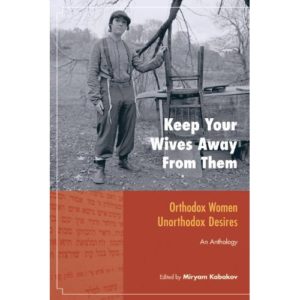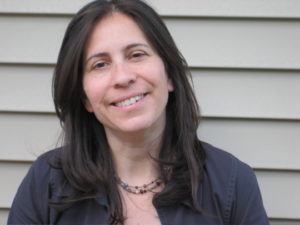Don’t Miss this Book & Film Event: Keep Your Wives Away from Them: Orthodox Women, Unorthodox Desires. This Thursday, June 10, 2010, 7:00pm at the St. Paul JCC.
June marks Gay Pride month, a time of formal and informal recognition of the lives of gay, lesbian, bisexual and transgender (GLBT) men and women. In virtually every community of any size, parades, concerts and cultural events galore fill the calendar.
For many GLBT people and those who love and support them, this is a special time of identity affirmation. However, even in the current era of growing legal protections and increasing cultural acceptance and integration, there are pockets of community – including our Jewish community – where acceptance is simply off the radar and visibility is not an option.
Unlike the Conservative, Reform and Reconstructionist movements of Judaism, very little integration between tradition, religious practice and sexual identity has taken place among Orthodox Jews. GLBT men and women in Orthodox communities often experience intense isolation and have to make difficult life choices that require them to struggle with between being true to who they are while remaining in their traditional religious communities.
Miryam Kabakov, a St. Paul-based writer and arts administrator, has edited a new anthology that tells the stories of 14 women who were at one point in their lives silenced and made invisible by the conflict between their sexual, religious and cultural identities. Keep Your Wives Away from Them: Orthodox Women, Unorthodox Desires presents a range of voices from people have come to terms with their identity as women-loving women and integrated this identity, in one way or another, with their identify as traditionally observant Jews. Said Kabakov:
The book’s contributors come from a wide range of experiences. They live in Israel, Brooklyn, Minnesota and elsewhere. One has eight children; another describes herself as a “masculine enthusiast,” and third is an organizer (along with Kabakov) of the New York Orthodykes support group.“When you’re in the Orthodox world, and it becomes clear to you that you don’t fit in a very fundamental way, your options are not many. . . . You can lose everything, or live in a way that’s dissonant with how you really want to live. It can be very destructive to live such a conflictual life.”
Kabakov characterizes coming out as lesbian in the Orthodox world as high risk. These women risk “homelessness – actual homelessness – along with spiritual homelessness and cultural homelessness,” she said. “If you leave, you leave and you don’t have anything, unless you have some bridges to the outside world to ease your passage.”
Despite facing these potentially dire consequences, Kabakov emphasizes that among these women she found “an incredible devotion to traditional Judaism and an incredible amount of joy that comes from being Orthodox. Some of these women want to maintain their ties to tradition and to the community, while others want to leave the world and move on.”
On Thursday, June 10th at 7pm, Kabakov will present a reading of excerpts from the anthology at the Jewish Community Center of Greater St. Paul. The evening will also include a screening of the short film “Keep Not Silent: OthoDykes” and a reception will follow.
Ed. Note: We hope that you, like us, want TC Jewfolk to stick around for a very long time. So we’re asking for a few minutes of your time so we can learn more about you. Oh, and if warm fuzzies aren’t enough motivation, maybe this is: the awesome folks at Parasole Restaurants (think Chino Latino, Salut, Il Gato and Burger Jones to name a few) have generously donated a $50 gift card for us to give away to one lucky survey taker. Your chance to enter is at the end of the survey. Click here to take the survey.






I’ve been thinking of reading this book – do you recommend it? Have any other TCJewfolk readers read it?
As one of the contributors to the volume, I was surprised when I saw the headline about it: “In Hiding: Orthodox Lesbians Stay Silent.” On the contrary, I believe the anthology attests to the many different voices in which observant or Orthodox LBTQ women speak about their experiences, insights, and challenges as members (or ex-members) of the Orthodox Jewish world. Their doing so has already shaped that world and will continue to do so.
Mara: I appreciate your feedback. I agree that the women whose voices are included in the anthology, as well as many others who have been touched by the work of Miryam Kabakov and others, are indeed far from silent. In that sense, the headline is discordant with the content and spirit of Kabakov’s anthology. Yet it seems there are other LBTQ Orthodox women who do not have the opportunity identify with a community women like themselves and experience intense isolation. It is from this context that the headline was written. Again, though, I completely agree with your point. If I had it to do over again, I would have would make a different headline choice.
Chris
Amy: I will be writing a review of the book later this month.
Chris